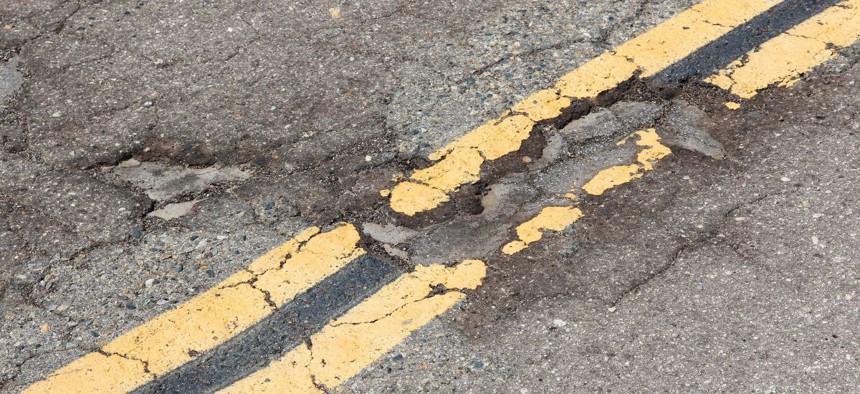D.C. Takes Its War on Potholes Mobile

It's that time of year again. Shutterstock
GIS mapping will be used in this year’s “Potholepalooza” to speed up repairs while keeping residents in the loop.
WASHINGTON — “Potholepalooza” is once again underway in the District of Columbia, and this year crews will use mobile devices to provide real-time updates on pothole repairs.
The first-ever “campaign to aggressively repair damaged roadways” citywide was in 2009, and since then the District Department of Transportation reports filling more than 64,000 potholes.
Geographic information system mapping technology is a marked difference with this year’s pothole push, with workers able to connect to the live service request database, touch the map and report repairs with photos to 311 that update within an hour.
“Today, we are taking a fresh approach to pothole repairs in the District,” Mayor Muriel Bowser said in a statement. “By adopting new strategies and technologies we are better able to identify potholes, repair them quickly and ensure residents can drive on District roads that are smooth, comfortable, and most importantly, safe.”
Each year, the District declares war on potholes... Today's war begins! #Potholepalooza pic.twitter.com/5A6W7eJuSV
— Mayor Muriel Bowser (@MayorBowser) April 1, 2016
Residents can follow along with crews’ efforts using this online map.

About 12,000 potholes were filled in March, according to DDOT, with extra crews working to respond to service requests within 48 hours—72 hours being what’s typical.
Residents can also report potholes by tweeting @DDOTDC with the #potholepalooza hashtag, using D.C.’s 311 smartphone app, texting “Pothole” and the location to DC 311 and typing “Status” for updates, emailing the Service Request Center, or phoning the 311 call center.
“Today, by declaring war on potholes, we are making it our mission to improve the condition of our roads,” said DDOT Director Leif Dormsjo in the statement. “Send us your requests, and make way for the crews and equipment that are working to repair our streets.”
As Route Fifty has observed in certain spots around the nation’s capital, the District’s annual efforts to fill of potholes can also cause gravel and other road-repair debris to accumulate along roadways. A request: Potholepalooza should be followed up with an aggressive street-sweeping effort.

Dave Nyczepir is a News Editor at Government Executive’s Route Fifty. Executive Editor Michael Grass contributed to this report.
NEXT STORY: States Looking to Curb Opioid Abuse Should Start by Strengthening PDMPs






